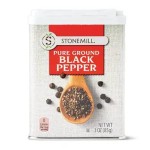Black pepper, a ubiquitous and versatile spice, is derived from the dried fruit of the Piper nigrum vine, a flowering plant in the Piperaceae family. Its distinctive pungent and slightly hot flavor comes from the presence of a chemical compound called piperine. Black pepper is harvested at various stages of ripeness and processed differently, resulting in the peppercorns we commonly see. Black peppercorns are the most common and are created by cooking the dried berries. Beyond its culinary uses, black pepper has also been used in traditional medicine for centuries due to its potential health benefits, including antioxidant and anti-inflammatory properties.
Black pepper's sharp, biting flavor adds depth and complexity to a wide range of dishes, from savory to sweet. It's a staple in cuisines around the world, enhancing the taste of meats, vegetables, sauces, soups, and even desserts. Whether used whole, cracked, or ground, black pepper's versatility allows it to be incorporated at any stage of the cooking process. Its ability to complement and elevate other flavors makes it an indispensable ingredient in countless recipes, contributing a subtle warmth and a touch of spice that enhances the overall culinary experience.

